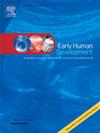出生时胎龄和足月婴儿的认知结局:来自中国和英国队列的证据
IF 2
3区 医学
Q2 OBSTETRICS & GYNECOLOGY
引用次数: 0
摘要
在早产儿中,较大的胎龄(GA)与更有利的认知结果相关。最近的证据表明,这可能也适用于足月出生的孩子。本研究旨在探讨GA与中国和英国足月出生儿童早期神经发育结果之间的关系。方法研究对象为来自中国四川多层次婴儿和早期生活研究(SMILE)和英国发育中的人类连接组项目(dHCP)两个队列的足月新生儿。SMILE研究在6个月时评估早期认知结果,dHCP研究在18个月时评估早期认知结果。采用线性回归模型分别检验每个队列中出生时GA与早期认知结果之间的关系。结果SMILE研究的1245名参与者和dHCP研究的406名参与者被纳入分析。在SMILE研究中,更长的GA与更好的心理发展相关(B = 2.47 [1.60, 3.34], P <;.001)和精神运动结果(B = 2.91 [2.01, 3.82], P <;.001),在控制了性别、父母教育程度、家庭年收入、母亲年龄、母亲抑郁症状和出生体重后;在dHCP组中,在控制性别、相对社会剥夺、母亲抑郁症状和出生体重后,GA时间越长,认知(B = 1.35 [0.33, 2.37], P = 0.010)和运动结果(B = 1.49 [0.59, 2.39], P = 0.001)越好。结论在不同的文化背景下,足月初中生的先天性GA与更有利的发展结果相关。本文章由计算机程序翻译,如有差异,请以英文原文为准。
Gestational age at birth and cognitive outcomes in term-born children: Evidence from Chinese and British cohorts
Introduction
Older gestational age (GA) has been associated with more favourable cognitive outcomes in preterm children. Recent evidence suggests this may also apply to term-born children. This study aims to examine the association between GA and early neurodevelopmental outcomes in children born at term in China and the UK.
Methods
Participants were term-born children from two cohorts, the Sichuan Multi-stratified Infants and Early Life (SMILE) study in China and the Developing Human Connectome Project (dHCP) in the UK. Early cognitive outcomes were assessed at 6 months in the SMILE study, and at 18 months in the dHCP. Linear regression models were conducted to examine the association between GA at birth and early cognitive outcomes in each cohort separately.
Results
A sample of 1245 participants from the SMILE study and 406 participants for the dHCP were included in the analysis. In the SMILE study, longer GA was associated with better mental developmental (B = 2.47 [1.60, 3.34], P < .001) and psychomotor outcomes (B = 2.91 [2.01, 3.82], P < .001), after controlling for sex, parental education, family yearly income, maternal age, maternal depressive symptoms, and birth weight; in the dHCP, longer GA was associated with better cognitive (B = 1.35 [0.33, 2.37], P = .010) and motor outcomes (B = 1.49 [0.59, 2.39], P = .001), after controlling for sex, relative social deprivation, maternal depressive symptoms and birth weight.
Conclusions
Older GA in term-born toddlers is associated with more favourable developmental outcomes across different cultural contexts.
求助全文
通过发布文献求助,成功后即可免费获取论文全文。
去求助
来源期刊

Early human development
医学-妇产科学
CiteScore
4.40
自引率
4.00%
发文量
100
审稿时长
46 days
期刊介绍:
Established as an authoritative, highly cited voice on early human development, Early Human Development provides a unique opportunity for researchers and clinicians to bridge the communication gap between disciplines. Creating a forum for the productive exchange of ideas concerning early human growth and development, the journal publishes original research and clinical papers with particular emphasis on the continuum between fetal life and the perinatal period; aspects of postnatal growth influenced by early events; and the safeguarding of the quality of human survival.
The first comprehensive and interdisciplinary journal in this area of growing importance, Early Human Development offers pertinent contributions to the following subject areas:
Fetology; perinatology; pediatrics; growth and development; obstetrics; reproduction and fertility; epidemiology; behavioural sciences; nutrition and metabolism; teratology; neurology; brain biology; developmental psychology and screening.
 求助内容:
求助内容: 应助结果提醒方式:
应助结果提醒方式:


